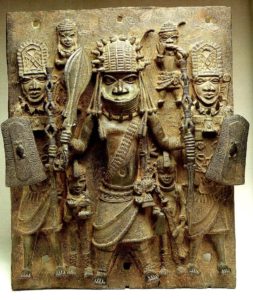by James Weeks | Aug 2, 2012 | Blog
The spirits of the dead may play a much bigger role in our health, wealth and happiness than we realize, says Dave Cumes M.D., an accomplished surgeon who is also known for his expertise in African healing traditions.
Cumes has taught at Stanford University and has a private urology practice in Santa Barbara, California. He is also a fully initiated “sangoma”, or medicine man who spent years studying the sacred healing traditions of his native South Africa. 
He is committed to bridging Western medicine and African healing wisdom.
“Western scientists believe that they are on the cutting edge of the new age of healing. However, we may have missed the boat entirely. We may be technical wizards but when it comes to the human spirit, we are really only beginners,” says Cumes.
“Many sangomas cannot read or write but they understand the principles of healing better than most Western-trained physicians,” adds Cumes, who lectures extensively and also provides spiritual readings, or divination sessions for clients.
Cumes believes Westerners can learn a lot from African sacred traditions. “Although some of the principles are difficult to understand, they work. They are the roots of healing, and they are still practiced to this day. We can only benefit from what we can learn from them,” Cumes says.
Perhaps Westerners can start by developing a relationship with their ancestors. “Indigenous African people believe in the ancestors and that they are there to help, protect and sustain us. If your ancestors turn aside, you are defenseless in life, like a paper blowing in the wind. If we are attentive and listen carefully for their messages, we will enjoy more health, wealth, and happiness,” he says.
In his book, Africa In My Bones, Cumes cites a study conducted by researchers at John Hopkins Medical Center which suggests a link between health and one’s relationship or lack of relationship with family.
“Researchers at the John Hopkins Medical Center studied the health of a group of more than one thousand medical students from the classes of 1948 to 1964. Researchers discovered that those physicians who developed cancer had much lower scores on closeness to parents, especially to their fathers,” says Cumes.
Cumes, who will share some of his insights in “Across The King’s River,” an upcoming documentary film by James Weeks that explores African healing traditions and modern science, says the research is still ongoing. “As Westerners, we might say that the parent’s love created lifelong balance, stability, and meaning and that it facilitated good health in the child. Indigenous African belief, however, may attribute the progeny’s good health to the dead parents’ and the grandparents’ protective spirits,” explains Cumes.
Weeks said it is gratifying to see that the Western medical establishment is finally starting to see value in what African healers have been saying and doing for centuries. “Maybe one day when you visit your doctor in the West or a psychologist, they’ll ask: ‘Do you have a relationship with your ancestors?” says Weeks with a laugh.
And how does one build a relationship with ancestors?
“One of the most effective ways to connect with ancestors is to set up an ancestor altar or shrine,” says popular African shaman Malidoma Some. “Doing so provides us with an invaluable tool to help focus our attention and awareness of their presence in our lives. It is also a tool to help deepen and nurture a relationship with them. There is no correct way to build a shrine to the Ancestors; use your intuition and imagination! It can be as simple or elaborate as you wish. Let the ancestors guide you!”
Malidoma, one the leading voices of African spirituality in the West, will also be featured in the film Across The King’s River. On his website, www.malidoma.com, Malidoma provides the following tips for building an ancestral shrine.
Choose a comfortable location in your home (or on your land) that can be designated as sacred space.
Choose a table or flat surface of any size or shape. Using a space on the floor or ground is fine.
You can choose to cover the surface or not. If you do, choose a cloth of any color or fabric. Items to put on the shrine can include:
Photographs of deceased family members or names written on paper
Cherished personal items passed down to you from relatives
A glass or bowl of water
Candles
Flowers or plants
Rocks or dirt from your Ancestors’ place of birth or homeland
Food and drink. This can be a small portion of your meals set aside for the Ancestors. Or you can place fresh fruit on the shrine
Spirits of alcohol, i.e. vodka, gin, rum, whiskey
Keep in mind that what is important is your sincere effort and good intention. Building an altar to the ancestors can be fun! There will come a time when the Ancestors will speak to you about what they want on their shrine. Pay attention and just listen!
How you honor and revere your ancestors is a personal thing. At your altar you can pray, talk, sing, chant, cry, meditate, recite poetry, etc. You can whisper or shout to them the most intimate details of your life. There is no right or wrong way to communicate with them and pay your respects. The important thing is that you do, and that you are sincere and genuine. It must come from your heart! In return, the ancestors will provide guidance, encouragement, and support. In time, your relationship with them will grow and you may find that you look forward to a daily commune with your ancestors.
For more information on Across The King’s River, visit www.acrossthekingsriver.com
by James Weeks | Jun 25, 2012 | Blog
Ebb and Flow is a short dance clip that features Tulani, my daughter, dancing on a beach in Southern California. You’ll get a chance to meet her in my upcoming film, but for now you can view Ebb and Flow here…
This clip is part of a series called Dances Made to Order, an on-line dance festival produced by Kingsley Iron. The music in Ebb and Flow was edited by Derick Silva.
On a philosophical level, the title as well as the dance, Ebb and Flow, makes me reflect on life as well as Ifa divination and the 256 sacred odus in our tradition that indicate there is an order and pattern behind all things in the universe. Everything ebbs and flows.
What are the sacred odus? The odus are divine forces which are applicable to every event in the past, present and the future. Like the universe, each odu consists of a pair of opposites, the finite and infinite, the male and the female, active and inactive, odd and even, hot and cold, good and evil, positive and negative.

Ifa, the ancient wisdom, is all about balance. Many of our problems arise because we are off balance and because we fail to understand that everything ebbs and flows. And each moment has a different message and lesson for us.
Instead of trying to force things to go your way, the challenge before us is to try to adapt our lives to this great cosmic rhythm and dance. Slow down, allow the meditation of this video to flow with you and through you. Blessings!!
by James Weeks | Jun 12, 2012 | Blog
I still hear the voice, the laughter and the wisdom. I have no doubt that the spirit of Dr. Afolabi Epega is with me as I sit with clients to practice the ancient art of Ifa divination. 
What is he saying to me? “The answer is not in the book, the answer is on the divination table. Speak the truth and let the client deal with the truth. Divination is not about what you remember; it’s about what you see as you cast the opele (divination chain). You can’t know everything about Ifa – no one does. But as long as you divine correctly, you will have an insight,” he tells me.
I also sense Epega’s is with me as I work on the vision for this film. What is he telling me?: “Just listen to the voices of the ancestors and allow us to work through you. As long as you follow our voice you can’t go wrong. Submit completely to the vision and don’t look behind you. Failure is not an option. Maintain the faith at all times. Keep moving forward because Across The King’s River film will rekindle the spirit of the masses,” says Dr. Epega from the Spirit World.
Dr. Epega passed over in 2006. A few days after his passing, I felt moved to write a tribute to him. You can read A Tribute to Afolabi Epega at this link:
Baba Epega, as he was affectionately called, was an accomplished scientist with an honors degree in organic chemistry and a 5th generation Ifa priest, or babalawo, who penned Ifa: The Ancient Wisdom, Obi: The Mystical Oracle and co-authored The Sacred Ifa Oracle. His mission in life was to show the connection between science and spirituality. The idea of showing the link between African spirituality and science in my film is inspired by the mission of Baba Epega and one of his students, Christopher Brown, a brilliant mathematician and Ifa priest.
Although I loved Baba Epega, I didn’t have a full appreciation for his wisdom until recently. Being a scientist, he challenged us to be innovative. Respect the tradition – but don’t allow it to stifle your growth. True spirituality is not about stagnation – it’s about the constant quest for growth. Find what works for you, then have the courage to embrace it even if it flies in the face of convention.
As I point out in my article, A Tribute to Dr. Epega, I didn’t accept his views on gays relationships and I found him to be sexist at times. Still, I am grateful for his significant contributions to Ifa. As I move forward on my journey, I do so with the full confidence that the old master is standing right behind me, guiding each step, ensuring that the sacred traditions of our ancestors will guide and nourish the next generation.
by James Weeks | Jun 3, 2012 | Blog
The Yoruba spiritual calendar year begins the first week of June at the Agbonnerigun, or Ifa festival which is held each year in the sacred city of Ile Ife. All the Orisas are invoked and prayers are said for the entire world. Offerings are also made to the Orisas. 
The blessing of wealth/money is the prediction for the year, which came down in the Odu, Ogbe Ogunda. Along with the blessing of wealth, the elders wish you the blessing of wisdom to move your life, relationships, your community and your dreams forward in a positive way. Ire O!
The Ifa temple is located on top of the Itase mountain. I’ve never been inside the sacred temple, nor have I ever had the opportunity to attend the yearly Ifa festival. But attending this yearly celebration is definitely on my growing “things to do” list.
When I reflect on the Ifa festival, I reflect on a comment made by Yoruba scholar Wande Abimbola, in his book, “Ifa Will Mend Our Broken World.” Abimbola says “There isn’t a single holiday to celebrate any traditional event in Africa. Not one! They have holidays to celebrate many Muslim and Christian events in Africa, but not one day is left for traditional people.”
As the sacred and philosophical teachings of Ifa continue to spread worldwide, we pray that our own people will make peace with our spiritual traditions and see the value of transmitting them on to the next generation. Ire o!
by James Weeks | May 20, 2012 | Blog
 “The yes man is your enemy, but your friend will argue with you.” So says a Russian proverb. I reflect on this proverb today as I think of our obligation to be truthful to ourselves and to those that we love. Yesterday, I had to remind a friend that his behavior and explosive temper is holding him back from achieving his full potential. His main enemy, despite what he wishes to believes, isn’t outside, it’s deep within. Until he changes his behavior and the way that he thinks, he’ll never attain his goals. Nor will he ever be happy.
“The yes man is your enemy, but your friend will argue with you.” So says a Russian proverb. I reflect on this proverb today as I think of our obligation to be truthful to ourselves and to those that we love. Yesterday, I had to remind a friend that his behavior and explosive temper is holding him back from achieving his full potential. His main enemy, despite what he wishes to believes, isn’t outside, it’s deep within. Until he changes his behavior and the way that he thinks, he’ll never attain his goals. Nor will he ever be happy.
I also reflect on this Russian proverb as I think of sad stories that I’ve recently heard of priests and priestesses in the Ifa/orisa tradition who cause more harm than good. Why? Because some of them are deeply troubled individuals who clearly are in need of psychological (and perhaps spiritual) counseling. Instead, they dole out “advice” and wreak havoc on others with conduct so outlandish that it truly amazes me how they could ever call themselves priests or priestesses.
Rather than condone bad character, we should confront it. There can be no growth without truth.
Wisdom has never been and will never be merely about what you know – it’s about how you live. The foundation of Ifa/orisa practice is supposed to be humility and iwa pele (gentle character). May we all never forget this.





